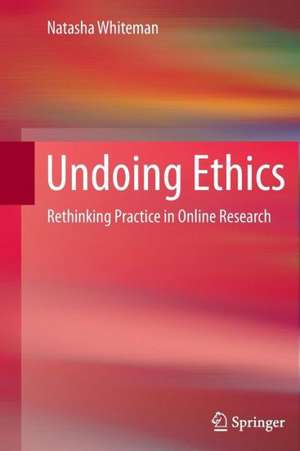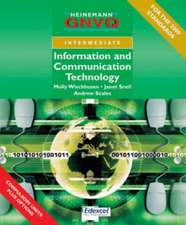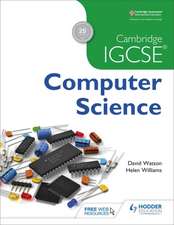Undoing Ethics: Rethinking Practice in Online Research
Autor Natasha Whitemanen Limba Engleză Paperback – 23 feb 2014
This book explores the relationship between the production of ethical stances in two different contexts: the ethical manoeuvring of participants within online media-fan communities and the ethical decision-making of the author as Internet researcher, manoeuvring, as it were, in the academic community. In doing so, the book outlines a reflexive framework for exploring research ethics at different levels of analysis; the empirical settings of research; the theoretical perspectives which inform the researcher’s objectification of the research settings; and the methodological issues and practical decisions that constitute the activity as research. The analysis of these different levels develops a way of thinking about ethical practice in terms of stabilizing and destabilizing moves within and between research and researched communities. The analysis emphasizes the continuities anddiscontinuities between both research practice and online media-fan activity, and social activity in on and offline environments.
| Toate formatele și edițiile | Preț | Express |
|---|---|---|
| Paperback (1) | 634.18 lei 6-8 săpt. | |
| Springer Us – 23 feb 2014 | 634.18 lei 6-8 săpt. | |
| Hardback (1) | 640.24 lei 6-8 săpt. | |
| Springer Us – 6 ian 2012 | 640.24 lei 6-8 săpt. |
Preț: 634.18 lei
Preț vechi: 746.09 lei
-15% Nou
Puncte Express: 951
Preț estimativ în valută:
121.37€ • 126.38$ • 102.57£
121.37€ • 126.38$ • 102.57£
Carte tipărită la comandă
Livrare economică 10-24 martie
Preluare comenzi: 021 569.72.76
Specificații
ISBN-13: 9781489985545
ISBN-10: 1489985549
Pagini: 168
Ilustrații: XII, 156 p.
Dimensiuni: 155 x 235 x 9 mm
Greutate: 0.25 kg
Ediția:2012
Editura: Springer Us
Colecția Springer
Locul publicării:New York, NY, United States
ISBN-10: 1489985549
Pagini: 168
Ilustrații: XII, 156 p.
Dimensiuni: 155 x 235 x 9 mm
Greutate: 0.25 kg
Ediția:2012
Editura: Springer Us
Colecția Springer
Locul publicării:New York, NY, United States
Public țintă
ResearchCuprins
- Preface.- Ethical Stances in Research.- The Achievement of Research Ethics.- Public or Private?-Text or Subjects?- Unstable Relations.- Undoing Ethics.
Recenzii
From the reviews:
“The author … uses this book to examine ‘some of the challenges that researchers may face when researching online activity and the ways that existing guidance on research ethics can inform our responses to these’. … She puts her case clearly and objectively, and places before her readers a set of arguments that enlighten and challenge. … I would urge all social scientists to read what Dr Whiteman has to say about the ethics of research practice – it would be time well spent.” (Maryam Nazari and G. E. Gorman, Online Information Review OIR, Vol. 36 (5), 2012)
“The author … uses this book to examine ‘some of the challenges that researchers may face when researching online activity and the ways that existing guidance on research ethics can inform our responses to these’. … She puts her case clearly and objectively, and places before her readers a set of arguments that enlighten and challenge. … I would urge all social scientists to read what Dr Whiteman has to say about the ethics of research practice – it would be time well spent.” (Maryam Nazari and G. E. Gorman, Online Information Review OIR, Vol. 36 (5), 2012)
Notă biografică
Natasha Whiteman is a member of the Department of Media and Communication, University of Leicester. Her PhD thesis was funded by the UK Economic and Social Research Council. Her publications include “Control and Contingency: Maintaining Ethical Stances in Research” (2010) International Journal of Internet Research Ethics; “The De/stabilisation of Identity in Online Fan Communities” (2009) Convergence: The International Journal of Research into New Media Technologies; “Learning at the Cutting Edge? Help-seeking and Status in Online Videogame Fan Sites” (2008) Information Technology, Education and Society; and "(Dis)possessing Literacy and Literature: Gourmandising in Gibsonbarlowville" (2004) in Andrew Brown and Niki Davis eds. The World Yearbook of Education 2004: Digital Technology, Communities and Education, Routledge: London (with Soh-Young Chung and Paul Dowling).
Textul de pe ultima copertă
Researchers entering into online environments for the purposes of research need to be able to demonstrate that they have considered the ethics of their practice, their use of data, and their relationship to the researched settings. No matter what the activity they are interested in, it is likely that they will be asked to account for the decisions they make and describe the strategies they have developed for managing the ethics of their work. The conflicting guidance on Internet-research practice and the diverse nature and characteristics of different online environments can make this task difficult. This book examines some of the challenges that researchers may face when researching online activity and the ways that existing guidance on research ethics can inform our responses to these. It further conceptualises the doing of research ethics as involving the production of an ethical stance in respect of key ethical issues and methodological decisions. This stance is established in relation to a number of different domains in which ethics are articulated/embodied (rather than involving self-evident notions of what actions might be ‘good’ or ‘bad’) and involves a consideration of the researcher’s accountability to different audiences and interested parties. The chapters examine the ways such stances might be established and unsettled during research and the resources that might be used to inform this ongoing work.
Caracteristici
Considers ethics in relation to the methodological, empirical, and theoretical domains of research Establishes an original transaction between academic and non-academic domains of research Situated within contemporary concerns of ethical accountability and regulation




